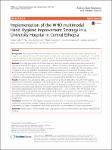Implementation of the WHO multimodal Hand Hygiene Improvement Strategy in a University Hospital in Central Ethiopia
Pfäfflin, Frieder
Tufa, Tafese Beyene
Getachew, Million
Nigussie, Tsehaynesh
Schönfeld, Andreas
Häussinger, Dieter
Feldt, Torsten
Schmidt, Nicole
Background: The burden of health-care associated infections in low-income countries is high. Adequate hand hygiene is considered the most effective measure to reduce the transmission of nosocomial pathogens. We aimed to assess compliance with hand hygiene and perception and knowledge about hand hygiene before and after the implementation of a multimodal hand hygiene campaign designed by the World Health Organization. Methods: The study was carried out at Asella Teaching Hospital, a university hospital and referral centre for a population of about 3.5 million in Arsi Zone, Central Ethiopia. Compliance with hand hygiene during routine patient care was measured by direct observation before and starting from six weeks after the intervention, which consisted of a four day workshop accompanied by training sessions and the provision of locally produced alcohol-based handrub and posters emphasizing the importance of hand hygiene. A second follow up was conducted three months after handing over project responsibility to the Ethiopian partners. Health-care workers’ perception and knowledge about hand hygiene were assessed before and after the intervention. Results: At baseline, first, and second follow up we observed a total of 2888, 2865, and 2244 hand hygiene opportunities, respectively. Compliance with hand hygiene was 1.4% at baseline and increased to 11.7% and 13.1% in the first and second follow up, respectively (p
Dateien zu dieser Publikation
Keine Lizenzangabe

